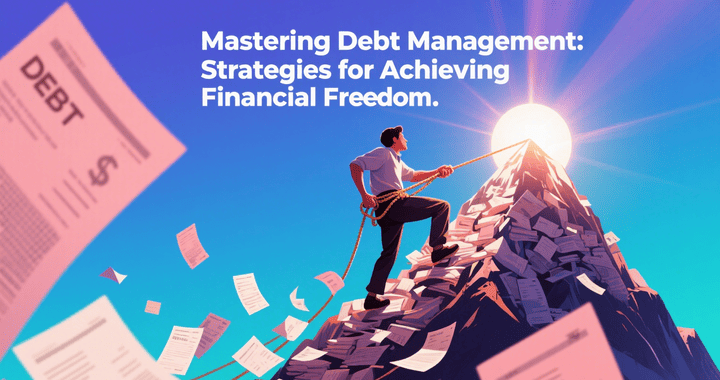Mastering Debt Management: Strategies for Achieving Financial Freedom

Mastering Debt Management: Strategies for Achieving Financial Freedom
In today's fast-paced financial landscape, managing debt effectively is crucial for achieving long-term financial freedom. With the increasing reliance on credit cards, student loans, and other forms of borrowing, many individuals find themselves overwhelmed by their financial obligations. This article provides a comprehensive guide to debt management, equipping readers with the knowledge and strategies to tackle their outstanding obligations and work towards a debt-free future.
Understanding Debt
Debt can be categorized into two main types: secured and unsecured. Secured debt is backed by collateral, such as a mortgage or car loan, meaning that the lender can claim the asset if payments are not made. Unsecured debt, on the other hand, includes credit cards and personal loans, which are not tied to any physical asset. Understanding the nature of your debt is the first step in developing an effective management strategy.
Assessing Your Debt Situation
Before you can create a plan to manage your debt, it is essential to assess your current financial situation. Begin by listing all your debts, including the total amount owed, interest rates, and monthly payments. This comprehensive overview will help you identify which debts are costing you the most in interest and which ones you should prioritize.
Create a Debt Inventory: List all debts with their respective details:
Creditor name
Total amount owed
Interest rate
Minimum monthly payment
Calculate Your Total Debt: Sum all outstanding debts to understand your overall financial burden.
Evaluate Your Monthly Budget: Review your income and expenses to determine how much you can allocate towards debt repayment each month.
Developing a Debt Reduction Plan
Once you have a clear picture of your debts, the next step is to create a debt reduction plan. There are several strategies you can adopt, and the best approach may depend on your personal financial situation.
1. The Debt Snowball Method
This method involves paying off your smallest debts first while making minimum payments on larger debts. Once the smallest debt is paid off, you move on to the next smallest, and so on. This approach can provide quick wins, boosting motivation as you see debts eliminated.
2. The Debt Avalanche Method
In contrast to the snowball method, the avalanche method focuses on paying off debts with the highest interest rates first. This strategy can save you money in interest payments over time, although it may take longer to see progress initially.
3. Debt Consolidation
Debt consolidation involves combining multiple debts into a single loan with a lower interest rate. This can simplify your monthly payments and reduce the overall interest you pay. Options for consolidation include personal loans, balance transfer credit cards, or home equity loans. However, it’s essential to consider any fees associated with consolidation and ensure that you don’t accumulate more debt in the process.
Improving Credit Management
Effective debt management also includes improving your credit management practices. A strong credit score can lead to better loan terms and lower interest rates, making it easier to manage debt. Here are some tips to enhance your credit profile:
Pay Bills on Time: Late payments can significantly impact your credit score. Set up reminders or automate payments to ensure you never miss a due date.
Keep Credit Utilization Low: Aim to use less than 30% of your available credit on credit cards. High utilization can negatively affect your score.
Monitor Your Credit Report: Regularly check your credit report for errors or discrepancies. You can dispute inaccuracies to improve your score.
Cultivating a Healthy Relationship with Money
Managing debt effectively is not just about numbers; it also involves understanding your relationship with money. Developing a healthy mindset can help you make better financial decisions and reduce the likelihood of falling back into debt. Here are some strategies to cultivate a positive relationship with money:
Set Financial Goals: Define short-term and long-term financial goals to give you a clear direction. Whether it’s saving for a vacation or planning for retirement, having goals can motivate you to stick to your budget.
Practice Mindful Spending: Before making a purchase, ask yourself if it aligns with your financial goals. This practice can help you avoid impulse buys and unnecessary debt.
Educate Yourself: Take the time to learn about personal finance and debt management. The more informed you are, the better decisions you can make regarding your finances.
Achieving Financial Freedom
The journey to financial freedom through effective debt management requires discipline, patience, and a proactive approach. As you implement your debt reduction plan, it’s important to celebrate your progress, no matter how small. Each payment made is a step closer to achieving your financial goals.
Remember, financial freedom is not just about being debt-free; it’s about creating a sustainable financial future. By mastering debt management and cultivating a healthy relationship with money, you can pave the way for a more secure and prosperous life.
In conclusion, managing debt effectively is a critical skill that can lead to financial freedom. By assessing your debt situation, developing a solid repayment plan, improving your credit management, and cultivating a healthy relationship with money, you can take control of your finances and work towards a debt-free future. Embrace the journey, stay committed, and remember that every step you take brings you closer to your financial goals.
Next:Investing for the Future: A Comprehensive Guide to Wealth Building
